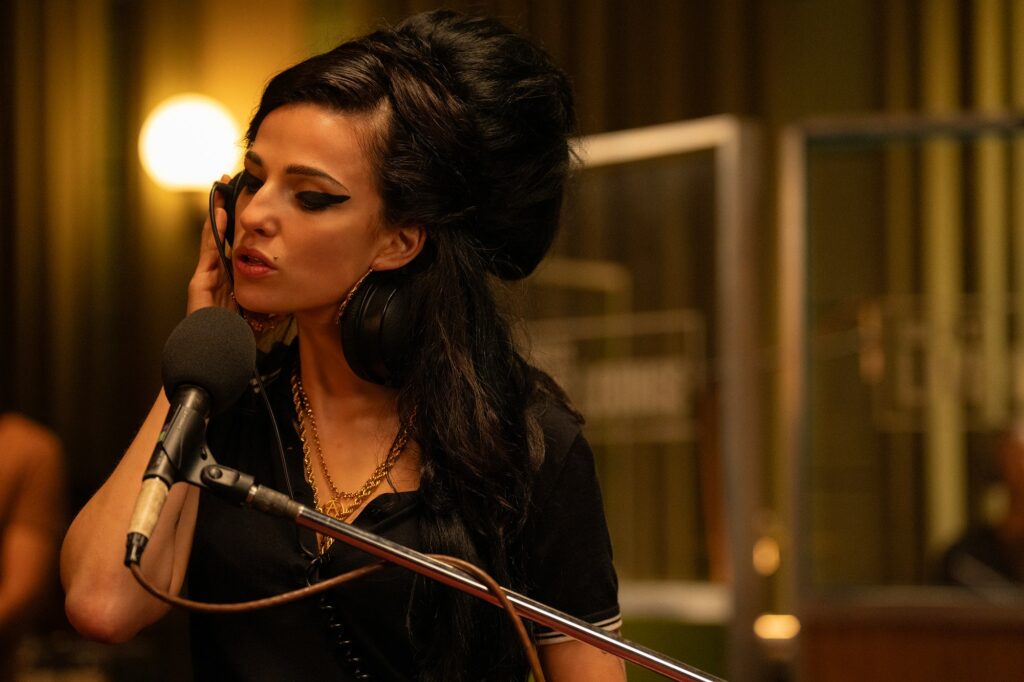Abela also learned how to sing like Winehouse, though her take on tracks like “Back to Black” has been ridiculed by Winehouse’s often ferocious and loyal fans since the film’s first clips and trailers popped up online. Is she frightened at all of that?
“I am super aware that it’s about to come out, and people are going to see it. And that feels super exposing,” she calmly replies. “It’s a very vulnerable feeling.”
Yet Abela is also clear-eyed about the ways in which her version of Amy isn’t a carbon copy of the actual woman. “I didn’t want people to be, like, ‘You couldn’t tell the difference!’ It’s not that. We had very specific discussions about prosthetics and teeth and jaws.” In the end, though, the production chose not to alter Abela’s appearance in that way. “I was, like, ‘Who are we kidding?’ It’s me; we know it’s not her.”
Using Abela’s vocals wasn’t in Taylor-Johnson’s original plan, either. Finding someone who could sing like Amy without her performance coming off like an impersonation, the director says, seemed like “too tall an order.” But though Abela told Taylor-Johnson early on that she wasn’t really a singer, mere lip-syncing was never in the cards for her. “Amy is one of the most iconic singers of her time,” says Abela, “so the singing was a non-negotiable for me.” To credibly become Winehouse, she’d at least have to look the way Winehouse did when she sang, even if that meant simply learning physical traits like “what you can see in my throat, my jaw. But I was gonna work as hard as I possibly could to get to that place where I am singing as Amy. Not like Amy.”
So Abela dedicated herself to two-and-a-half hours of singing lessons every day for four months, and worked with record producer Giles Martin—who trained Taron Egerton for Rocketman—to learn how to replicate Winehouse’s style. “The harder I worked, the closer I actually got to it,” she says. Abela’s vocals—recorded at the iconic Abbey Road Studios, the location of Winehouse’s last-ever recording with her hero, Tony Bennett—wound up in the film.
The point, the star says, is to show how brightly Winehouse shone, how very deeply she felt, and how that all culminated in her iconic music, despite her struggles with addiction and bulimia. “My job was to try and embody that,” Abela says.
Onlookers often describe Winehouse’s career, life, and death as tragic. But Abela was attracted to Greenhalgh’s script and Taylor-Johnson’s vision because of the “life and joy and power and effervescence” that they held. “I want to tell a story that reminds me that she was a fucking riot, you know?”
Asif Kapadia’s 2015 documentary Amy was indeed a tragic portrayal of Winehouse’s downfall, even as it aimed to be objective. The film, which won an Oscar for best documentary, wove together found footage of Winehouse with interviews of the people who knew her best—including her best friend, Juliette Ashby; her close friend and manager from 1999 to 2006, Nick Shymansky; and Fielder-Civil. Her father, Mitch Winehouse, participated in the film too, but ended up hating it. Abela found it incredibly helpful.
>>> Read full article>>>
Copyright for syndicated content belongs to the linked Source : VanityFair – https://www.vanityfair.com/hollywood/story/marisa-abela-back-to-black
